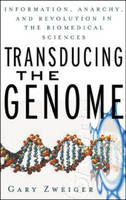
Transducing the Genome: Information, Anarchy, and Revolution in The Biomedical Sciences
McGraw-Hill Professional (Verlag)
978-0-07-138761-3 (ISBN)
- Titel ist leider vergriffen;
keine Neuauflage - Artikel merken
The human genome (for the most part) has been sequenced, and we now find ourselves poised on the brink of a new era in science and in life. The enormous investment of money and effort that has been made in the HGP has brought into being a new science, the science of genomics. Going beyond the linking of genes to their expressed traits, genomics is the study of the genome as a whole. Its material is the millions of nucleotides that make up the DNA of an organism and their patterns of combination and recombination. It is fueled by the mountains of data that the HGP's gene sequencers are producing, data that can only be manipulated and understood with supercomputers. Much more than being sequenced, the genome is being transduced, that is, converted into electronic form, a digital entity. In short, genomics is an information science, and it is dragging all of biology kicking and screaming into the Information Age. Transducing the Genome is an incisive, behind-the-scenes look at this historic transformation.
A geneticist whose career has placed him at the center of the action at such companies as Genentech and Incyte, Zweiger understands the business of genomics: the unique and anarchic collaboration of private, government and academic efforts in the HGP; the role of pharmaceutical companies; and the interests of investors. He gets into details of the genetics, which is much more complicated and more interesting than the search for disease genes, and which will come into full flower only now that the human sequence has been completed. He explains the many new technologies that are coming out of the HGP and gives us a glimpse into their future applications. Most importantly, Zweiger places the people, the events, and the historical forces at work within the philosophical context of information science, providing the framework within which the historic milestone of the sequencing of the human genome and the birth of genomics will be understood for years to come.
Gary Zweiger, Ph.D. is a geneticist and Director of Business Development and Strategic Planning at Agilent Technologies, a leading producer of DNA microarrays (gene chips) and other biomedical tools. Prior to joining Agilent, he was Senior Strategic Advisor at Incyte Genomics, Inc., a founding company in the genomics industry. He has also worked as a consultant to venture capitalists, investment bankers, and other early backers of the emerging genomics industry, and has taught classes in human biology and biotechnology at several colleges. While at Incyte, Dr. Zweiger studied thousands of genes by using enormous biological databases and designed several powerful microarrays to help further his research into the molecular changes that accompany prostate, breast, colon, and pediatric cancers.
| Erscheint lt. Verlag | 16.3.2002 |
|---|---|
| Sprache | englisch |
| Maße | 152 x 226 mm |
| Gewicht | 380 g |
| Themenwelt | Sachbuch/Ratgeber ► Natur / Technik |
| Studium ► 2. Studienabschnitt (Klinik) ► Humangenetik | |
| ISBN-10 | 0-07-138761-7 / 0071387617 |
| ISBN-13 | 978-0-07-138761-3 / 9780071387613 |
| Zustand | Neuware |
| Haben Sie eine Frage zum Produkt? |
aus dem Bereich


